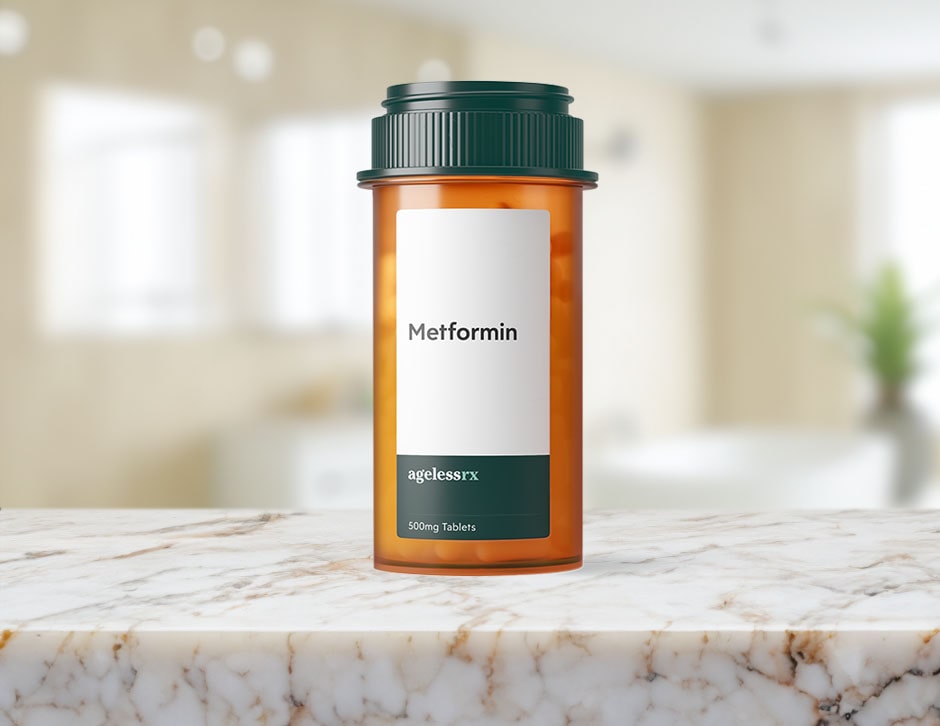
From the Desk of Dr. Z: AgelessRx Co-founder and Chief Medical Officer, Dr. Sajad Zalzala offers his insightful perspective on topics related to longevity. With a wealth of experience and a deep-seated passion for disease prevention and extending healthy lifespans, Dr. Z is dedicated to sharing his knowledge on the secrets to longevity. Today, he shares his knowledge on lactic acidosis with Metformin, and whether it’s a legitimate risk.
Here’s what we’ll cover in this blog post:
- Lactic acidosis is a rare side effect of Metformin
- When it does occur, lactic acidosis may have other causes
- Several studies showed no association with Metformin and lactic acidosis
There is a joke amongst pharmacists and physicians that if people actually read the full list of side effects on the packet insert, nobody would ever take medications. When it comes to serious side effects, Metformin is among the safest out there. However, patients read about Metformin and lactic acidosis, and they shy away from Metformin. So, what is lactic acidosis and how real is this risk?
What Is Lactic Acidosis?
Lactic acidosis is a form of metabolic acidosis in which individuals overproduce and/or under-metabolize lactic acid. When lactic acid exists in excess, and the body cannot process and remove the excess acid, acidity levels in body fluids, like blood, will spike.
This causes an imbalance in the body’s pH—which should always remain slightly alkaline. If it becomes too acidic, it can potentially turn life threatening. Symptoms of lactic acidosis include confusion, muscle cramps, decrease in appetite, abdominal pain, exhaustion, or extreme fatigue.
Are Phenformin and Metformin the Same?
Studies show that one type of medication, Phenformin, can cause lactic acidosis, particularly in patients already experiencing renal issues. Phenformin belongs to a class of oral diabetes medications called biguanides. Scientists first isolated biguanides from G. officinalis, also known as Goat’s rue or French lilac.
Metformin belongs to this same class of medications, but Metformin is much less toxic to humans. Currently, Metformin is the only biguanide available in the USA. Phenformin caused 306 cases of lactic acidosis in 1976, which is the last year it was available in the US.
But Metformin is not Phenformin. Patients have historically tolerated Metformin very well, which is partly why the World Health Organization added Metformin to its list of essential medicines.
What Do Studies Show?
Since then, studies show that Metformin did not increase the risk of lactic acidosis. In one study, zero occurrences of lactic acidosis were observed among type 2 diabetes patients utilizing Metformin. A widespread review4 found no cases of lactic acidosis in 36,000 patient-years of exposure to Metformin and concluded that there was no evidence to support a role for Metformin in the development of lactic acidosis.
Among approximately the first million patients who have received Metformin in the U.S., 47 reports were made to the FDA of lactic acidosis. Of those, only 20 were fatal; 43 of the 47 cases had renal failure or congestive heart failure prior to taking Metformin. Both renal failure and congestive heart failure are contraindicated per the medication insert for use of Metformin. Studies done on patients with type 2 diabetes have shown that the rate of lactic acidosis is similar in patients who are taking Metformin and in patients who have never taken Metformin.
When Not to Take Metformin
Individuals with contraindicated conditions should avoid the use of Metformin. This includes conditions such as congestive heart failure or kidney or liver disease. Some medications in combination with Metformin might also increase the chance of lactic acidosis, such as topiramate and acetazolamide. Patients undergoing surgery or having any diagnostic test using dyes (such as CT scans) should also avoid Metformin.
For nearly all other patients, Metformin is a generally very safe drug to take whether you are diabetic, or taking it for other reasons, such as to reduce the risk of age-related diseases.
Bottom line? Metformin is not Phenformin and does not appear to cause lactic acidosis. If you are concerned with lactic acidosis, or feel you may be at a higher risk of developing it, be sure to consult with a medical professional prior to taking any new medication.
Note: The above statements have not been evaluated by the Food and Drug Administration. This product is not intended to diagnose, treat, cure, or prevent any disease.
